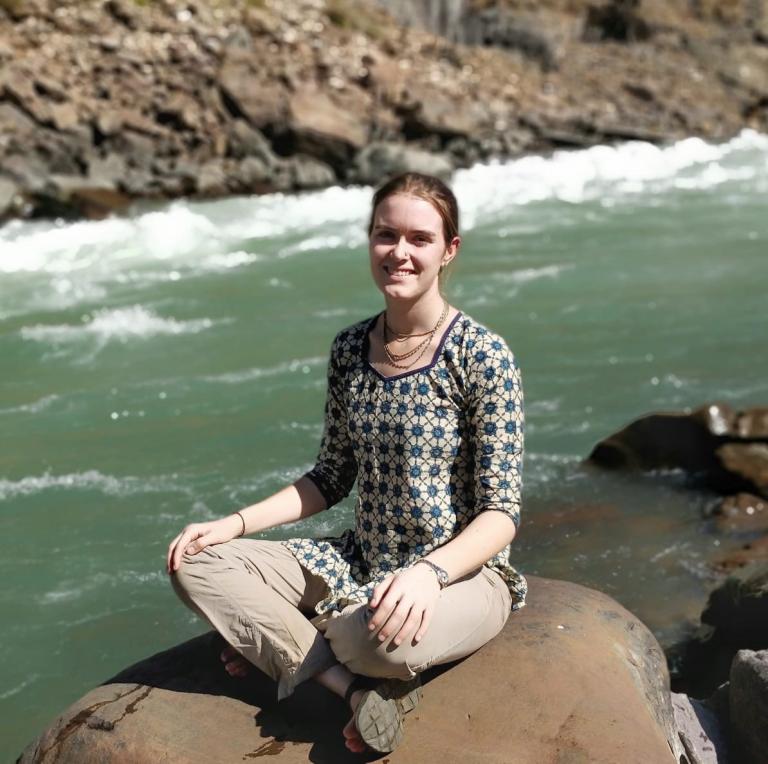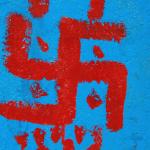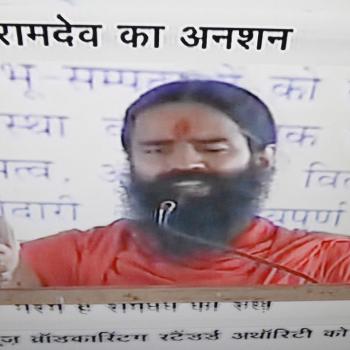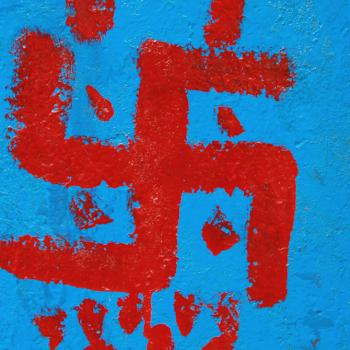The phenomenon of non-Indians adopting Hinduism is not new. However, the stories of how individuals came to the religion have not been regularly recorded. I hope to rectify that by time to time publishing interviews with those people who weren’t raised Hindu but now publicly identify as such, in the hopes of shedding some light on what drew them to Sanatana Dharma.
The following is an interview with Allegra Lovejoy, an organic farmer, permaculture designer, and writer, who works in the field of land conservation and planning. She is a graduate of Princeton University and a current Masters student at Yale University School of Forestry and Environmental Studies. She is a member of the Bhakti Center Sacred Ecology Forum in her hometown of New York City.
 How did you first get attracted to Hinduism?
How did you first get attracted to Hinduism?
I first became aware of Hinduism as an eighteen-year-old looking for meaning. I had started practicing yoga and meditation a few years prior when, by the Grace of God, a yoga studio opened up in my quiet residential neighborhood in Brooklyn. Yogic philosophy and practices started to have a transformative impact on my physical and mental health, and I was hungry for more.
During my first few weeks of college, I met our Hindu chaplain and was incredibly attracted by the philosophy and worldview I started to learn in his Bhagavad-Gita classes and the student Hindu group.
I truly feel that it was Krishna who guided me to that college, that connected me with our chaplain, and that opened my mind and heart to this path. The sense of oneness and harmony in all aspects of the universe; that nothing is separate from God and that God permeates everything; that there is a deeper purpose to everything beyond what is immediately perceptible to us; and the intimacy and love between the Divine and each soul was incredibly attractive to me.
When and why did you first identify as Hindu?
I started exploring a Hindu identification pretty immediately. I didn’t see it as an identity conflict of any sort. I was so attracted to the philosophy and way of life that it felt quite natural.
I was also surrounded by other Hindu youth of various ethnic backgrounds — rather than a yoga or mindfulness community — so that may be why it felt more natural.
A lot of people get exposed to yoga, meditation, Hindu philosophy, etc in a digested form in a yoga or mindfulness center and have, at best, an interest in discovering the authentic form but feel some sort of barrier, or at worst, a lack of interest in moving outside that ‘comfort zone.’
There certainly can be a cultural barrier or at least an uncertainty about how to get involved in Hindu community or teachings, but that anxiety doesn’t have to be there. I really encourage people to go deeper, to step outside of their comfort zone and try to learn from the source, and be open to a journey of transformation. That’s what it’s all about, isn’t it?
Have you ever found there to be a conflict between any Western values you uphold and those of Hinduism?
Yes. There are major differences between the values underpinning Western culture and Hindu or Dharmic values.
For example, a foundation of Hinduism is the integral unity of all that exists. There is no real separation between spirit and matter or one person and another. Each is essentially, eternally, one. Hindu and other Dharmic traditions also firmly believe that that oneness can be easily experienced by any of us; it’s not just a theory. Most spiritual traditions are oriented towards deepening this experience and sharing the abounding love that results.
By contrast, Western philosophy is rooted in separateness — of God and Creation in the Abrahamic worldview and of matter, logic, and spirit in the closely related Greek worldview. These differences aren’t just theoretical; they influence all aspects of philosophy, governance, and culture.
On a personal level, I do often feel a conflict between the American culture I was raised in and the Dharmic values to which I aspire.
It’s sometimes hard to have faith in oneness when all the cultural symbols around me, as well as the mood of the people, are pulling me back into the misery of separateness.
I also sometimes struggle between American idealism and individualism, and a Dharmic patience and faith in the unfolding flow of things.
There are other areas that these differences show up, such as the American approach to valuing life compared to the Dharmic approach, different values around individualism and community, and many others.
How does your Hindu-ness manifest?
Like many millennials I have a purpose-driven and values-based life. The values I have learned from my teachers and the purposeful approach to service and transformation play a core role in that.
The values of ahimsa, of truth-telling, of dharma and integrity, of bhakti and surrendered devotion, of community care, of selfless service, and of loyalty to parampara (our spiritual predecessors) have really shaped my life over the last several years. And my ‘purpose,’ in spiritual ecology, comes directly from the inspiration of my guru.
It also shows up specifically in the acts of daily sadhana (contemplative practice), eating an ahimsa vegetarian diet (a diet that minimizes ecological harm and avoids products linked to animal cruelty) and offering food as prasad, and doing my best to be both member and ally of the Hindu community.
What’s your spiritual path like?
I follow a Bhakti tradition that is focused on developing a devotional relationship with Sri Krishna Bhagavan and a service orientation to God, guru, and all living entities.
The Bhakti tradition was one of the first that I encountered and although I was very drawn to it, I actually spent several years exploring different sampradayas (lineages) because it was important to me to have a spiritual and philosophical context for bhakti, karma, yoga, jnana, and various practices and traditions.
I benefited tremendously from learning in different sampradayas and am very grateful to the teachers and sadhakas I encountered both here in the US and in India.
Eventually I did settle on Bhakti and ISKCON. I find that the intimate, devotional, and surrendered orientation of Bhakti is more intense, more transformative, and more healing for me than other paths I studied. The ego just gets constantly crushed and lovingly embraced at the same time. ISKCON can sometimes come off as sectarian but the core philosophy and the history of the tradition really isn’t. I do continue to incorporate what I’ve learned from other sampradayas and I don’t see that as a conflict at all; in fact, it makes my experience much deeper.
How has the Hindu community responded to you?
Overall I feel accepted, sometimes an object of curiosity, and occasionally an object of challenge.
While some Hindu communities (like ISKCON) already have a high level of diversity and it’s easy to fit right in, in other communities there’s less familiarity with people who have adopted Hinduism, so some amount of curiosity or confusion is natural.
I have noticed that I and many other white Hindus often feel somewhat disgruntled when we have to give explanations for who we are and why we’re here every time we enter a new space or meet yet another relative of a Hindu friend. At some point I realized that that irritation comes from a sense of entitlement. Especially for white people, we are accustomed to being treated with respect or even, to be honest, deference wherever we go. Being questioned or not being treated as king of the hill is therefore an unexpected experience and can trigger feelings of loss aversion. In a Hindu community, we are guests and are lucky to be there, even if we’ve been practicing for five or ten or twenty years. I learned to let go of my entitlement and became comfortable being a participant and a follower in some spaces, rather than needing to be a leader in all spaces.
The second dynamic that can come up is being an object of challenge. People who have experienced discrimination may sometimes want to ‘protect’ their space (whether a group of devotees or a physical space like a temple) from someone who is seen as the outsider or the representative of the dominant culture. I may believe that I’m an insider, but I still need to respect that person’s experiences and accept that there are other places I can go if he or she wants to protect this space.
Additionally, those who are very aware of the impact of colonization, privilege, and cultural appropriation may challenge people who have adopted Hinduism on the authenticity of that identity. For us, it’s very, very important to thoroughly learn about and consider this history and these dynamics, even if — especially if — it’s emotionally challenging. We have an obligation not to bypass the painful dynamics of history and modern-day power, privilege, and cultural exploitation; otherwise, we simply end up like any other appropriator.
As a white Hindu it’s very easy to ‘code-switch;’ to assimilate back and forth between dominant white culture and the culture of my adopted tradition. A darker-skinned Hindu doesn’t have that same privilege. I feel a strong responsibility to be a representative of my tradition and of the broader Hindu heritage wherever I go, to use my privilege and access to be a good advocate and representative in spaces that a Hindu of Indian or Caribbean or African origin may not have the same access to.
Have you ever been discriminated against for being Hindu?
No, I can’t think of any such experiences.
There have been times I was not allowed inside certain temples in India, but it doesn’t really bother me. I respect the customs of those temples and was grateful to be able to visit at all. I haven’t had any experiences of discrimination by non-Hindus either.
Sometimes people say something out of ignorance, but that’s not discrimination. It’s an opportunity to be an educator and to be the best representative I can be of my tradition.
There’s actually this odd moment of privilege that comes along with being of a Dharmic faith tradition, at least in the ecological circles I travel in; people are pretty excited to hear about Dharmic perspectives.
Have you ever been made to feel like less of a Hindu because of your race?
I’ve certainly met people who believe ‘Hindus have to be born in India’ but that logic dismisses the entire diaspora, doesn’t it? On the opposite extreme, there are those who believe that ‘everyone is Hindu,’ that the presence of a path of evolutionary growth in someone’s life — regardless of what tradition they adhere to or lack thereof — somehow brings them into the Hindu fold. And then there are those who say “there is no such thing as Hinduism.”
I understand why historically we can problematize the concept of Hinduism and Hindu identity, but nowadays we do need a unified community.
To me, a need to be accepted by others as Hindu is more or less a non-issue because faith, sraddha, in guru or parampara is something that develops in the heart and leads one down the spiritual path, no matter what their ethnic background is.
I actually feel incredibly fortunate that so many gurus did start to travel outside of India in the late 19th and 20th centuries and made it possible for people like me to find these paths.
I have noticed a lot of people who have adopted Hindu practices carrying a need to try to “prove themselves” in some way or put on some kind of affectation of Indian attire, giving themselves a Sanskrit name, and always pushing their beliefs or trying to sound “super spiritual.” People can have a big chip on their shoulder and it’s an obstacle to their growth and, as a fellow white Hindu, is kind of embarrassing.
How did you family accept your adoption of Hinduism?
My parents are very sincere Christians and really appreciated the positive influence that my Hindu community and practices had on me. We enjoy discussing philosophy, ethics, and metaphysics. In our broader family and social circle, it’s been an opportunity for us to go deeper together into spiritual topics and experiences, and an opportunity for me to be a bit of an educator about aspects of Hindu and Indian culture around which there is typically bias and misinformation in America.
Do you think there’s a unique Western or American Hinduism developing, or will develop?
I see a few trends in American Hinduism.
One trend is that, due to the influence of second-generation Hindu Americans, Hindu communities are becoming more inclusive, less socially conservative, and more focused on the educational and social needs of youth. (I assume it’s similar in Canada and the UK, but I’m less personally familiar with those communities.)
But except for a handful of communities like ISKCON, I’m not seeing so much integration of people who have adopted Hinduism into existing communities. With notable exceptions, they’re mostly staying in spaces like SRF or TM or the booming yoga-bhakti scene – spaces that are mostly full of other liberal, affluent, mostly-white people.
The risk of this is that when people stay in their comfort zone and stay in a space of digested Hinduism without an authentic parampara, that trend of digestion only accelerates, which is exactly what we’re seeing now. From a powerful, transformative, and venerable ancient tradition, we get self-help slogans, wellness centers, and commercial fads. You start to enter into the realm of cultural appropriation: taking on just the shell of something without understanding what’s truly inside, while acting out bias against the original carriers of that culture.
I am not sure that I could call this digested yoga-bhakti-mindfulness community “American Hindus.” They probably wouldn’t call themselves that either. On the one hand it’s positive that dharmic values and practices are being spread, but without the guidance of parampara, it’s dangerous territory. Although a lot of us are trying to be bridge-builders and advocates and pull the Hindu Americans and American Hindus back together, I only see this trend continuing in the coming decades.
Do you think it’s necessary for people adopting Hinduism to prioritize Indian dress or social cues? Take on a Sanskrit name?
No, not at all. In fact, often these things can come across as an affectation and become inappropriate.
Just because someone identifies as Hindu, doesn’t mean they have a free pass to play around with aspects of Indian culture, or, frankly, with aspects of Hindu devotions or practices that they don’t understand.
False pretense is a big issue of concern in this regard. Just as with any other adherent, there’s an obligation to follow and respect tradition, be sincere and responsible, and be humble before one’s gurus.
Within a given community there may be explicit or implicit standards of etiquette (including attire) and that should be respected without false pretense. Some communities do have a convention of receiving a spiritual name, but the adherent would follow those conventions, not just ‘make up’ their own name.
What’s your relationship with India?
(Laughs) I have a complicated relationship with India, probably like most people.
On the one hand I absolutely love it, try to go every year, and am always completely blown away, humbled, inspired, and fall in love with the pilgrimage places I visit and the people I meet who are doing so much service.
There are a few pilgrimage places that I always try to visit and I try to explore a new place each time, including “non-holy places” (although to so many Hindus and diaspora, all of India is basically holy).
But it’s also a complicated country that’s really trying to figure out its identity, and it has a complicated history with a legacy of materially and spiritually powerful kingdoms followed by centuries of foreign rule and exploitation of that culture and riches. The damage done by colonialism is not yet fully understood, especially since most people nowadays would rather not think about it, and we’re basically in a new era of colonialism now with slavery to the dollar and to the American dream that has been imported in the last couple of decades. So it’s a complicated situation.
When I go I try to have a ‘good impact’ in terms of my ecological footprint, giving charity, and doing knowledge exchange, but it’s also an intense experience because I am extremely aware of my privilege as a White/American/Female person, and of my uncomfortably outsize impact when I am there. But as a Hindu I have so much reverence for Bharat Mata, Who has given me everything, and I am very concerned for the wellbeing of India culturally, economically, ecologically. I feel a kind of obligation there and I hope that I can offer service one day in India based on my career in sustainable land management and water conservation and agriculture.















